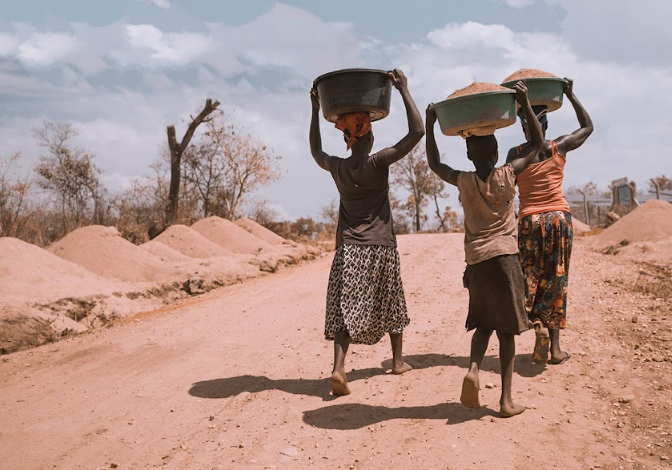Breaking the Cycle: Solutions for Hunger in Africa

As you examine the complex issues surrounding famine in Africa, consider what role you can play in being part of the solution. With compassion and understanding, educate yourself on the historical factors and current challenges people face in achieving reliable access to nutritious food. Recognize the resilience and resourcefulness of local communities as they work to provide for their families. Ask yourself how you can best support organizations that empower Africans to develop localized systems and infrastructure for sustainable agriculture and equitable food distribution. By becoming informed and engaged global citizens, we all have the power to be part of the positive change needed to help break the tragic cycle of hunger in Africa.
Understanding the Root Causes of Famine in Africa
Historical Injustice
The historical legacy of colonialism and uneven global trade policies have disadvantaged African nations, limiting their agricultural productivity and economic growth. During colonial rule, many Africans were forcibly moved to less fertile land and traditional sustainable farming practices were disrupted. International trade policies and global markets have also made it difficult for African farmers to compete, trapping many in cycles of poverty.
Environmental Degradation
Prolonged droughts, desertification, and climate change have made farming in many parts of Africa increasingly difficult. As deserts expand southward, arable land is lost and water scarcity becomes more widespread. Changes in weather patterns have also increased the frequency and severity of droughts, leaving crops and livestock vulnerable. These environmental challenges, combined with a lack of access to modern farming technologies, have made it hard for many Africans to adapt to changing conditions and consistently produce enough food.
Conflict and Governance
Political instability, conflict, and poor governance have exacerbated hunger in Africa. Corruption, lack of infrastructure, and mismanagement of resources have prevented aid and economic opportunity from reaching those most in need. Violent conflicts have also displaced many farmers from their land, disrupted trade routes, and diverted resources away from agriculture and social programs. International donors and policymakers must work to establish peace, strengthen institutions, and improve transparency across the continent to overcome these political roadblocks to food security.
By gaining a deeper understanding of these historical, environmental and political factors fueling famine in Africa, the global community can develop comprehensive solutions to meet the root causes of this crisis and work to build a sustainable future free from hunger. Through cooperation and long-term investment in African agriculture, economic growth and democratic governance, we have the opportunity to break the cycle of food insecurity that has plagued the continent for generations.
Implementing Sustainable Agricultural Practices
To establish sustainable agriculture in Africa and overcome hunger, several practices should be implemented.
- Promoting Agroecology: Traditional African farming methods that utilize crop rotation, intercropping, and biodiversity should be embraced. These agroecological practices improve soil health, minimize pest damage, and maximize crop yields in an environmentally-friendly manner. Integrating trees, animals, insects, and crops creates a self-sustaining ecosystem resilient to climate change.
- Investing in Irrigation and Infrastructure: Developing water management systems and enhancing transportation networks are imperative to support agriculture. Irrigation infrastructure allows smallholder farmers to produce crops year-round rather than rely on inconsistent rainfall. Improved roads provide farmers access to resources and enable the distribution of goods to markets. Partnerships with local governments and NGOs can fund and facilitate the development of sustainable infrastructure.
- Supporting Smallholder Farmers: Empowering smallholder farmers through education, resources, and technology is key to establishing sustainable agriculture. Teaching ecologically-sound farming methods and business skills helps farmers thrive independently. Providing resources like drought-resistant seeds, training on natural fertilizers and pesticides gives farmers the tools to succeed. Connecting farmers to mobile technology and financial services opens opportunities to obtain real-time market information, apply for loans, and sell goods.
By promoting agroecology, investing in infrastructure, and supporting smallholder farmers, sustainable agriculture can be achieved in Africa. Combining traditional knowledge with modern innovations, farmers gain resilience and self-sufficiency to overcome hunger and improve livelihoods for generations. Transitioning from industrial methods to sustainable farming practices establishes a fertile environment where agriculture and community can flourish.
Strengthening Food Security and Nutrition Policies
To break the cycle of hunger in Africa, governments must implement effective food security and nutrition policies.
Improving distribution networks by enhancing storage facilities and transportation systems is critical to reducing food waste and ensuring equitable access, especially for remote and impoverished communities. Governments should invest in infrastructure like roads, railways, and warehousing to facilitate the transport and preservation of agricultural goods.
Implementing nutrition programs focused on maternal and child health, micronutrient supplementation, and education on balanced diets is essential to alleviating malnutrition and promoting healthy development. Prioritizing affordable access to nutritious foods, prenatal care, and healthcare for children under five years of age should be a key policy objective. Educating communities about inexpensive, nutritious meal options and the importance of dietary diversity can help maximize the impact of limited resources.
Fostering international cooperation, investment, and humanitarian aid is necessary to address immediate needs and build long-term resilience. Policymakers should encourage strategic partnerships with foreign governments, NGOs, and private sector companies to attract funding and technical support for agricultural development, emergency response, and poverty alleviation programs. Welcoming external assistance and expertise helps strengthen domestic capacity to ensure sustainable solutions. Open communication and shared responsibility among stakeholders are vital to coordinated action.
In addition to traditional methods, leveraging technology such as dynamic QR code generators can revolutionize food navigation and tracking systems. These tools enhance transparency in food distribution by enabling real-time monitoring of supply chains. QR codes attached to food items provide crucial information about origin, safety, and nutritional value, empowering consumers to make informed choices. Moreover, these technologies facilitate efficient tracking of food aid distribution, ensuring timely delivery to intended recipients. Embracing such advancements fosters accountability, reduces waste, and optimizes resource allocation, ultimately contributing to more effective food security and nutrition policies in Africa.
By developing and enforcing prudent policies around distribution, nutrition, and cooperation, African governments can systematically improve access to affordable, nutritious foods for the most vulnerable populations. Tackling the root causes of hunger will require political will and a commitment to evidence-based solutions, but the rewards of a food secure and prosperous Africa are well worth the effort. Collective action can help end the cycle of poverty and malnutrition, giving rise to a healthier, more just, and equitable society overall.
Conclusion
Taking action to address hunger in Africa requires collaboration and perseverance. By supporting initiatives that empower communities to develop local solutions, you can help break the cycle of poverty and malnutrition. Consider getting involved with organizations working on the ground to increase access to education, healthcare, clean water, and sustainable farming practices. Transformation starts small but through dedication and partnership between nations, progress will ripple outward to create lasting change. There is still much work to be done but each contribution brings us one step closer to the day when no child in Africa goes hungry.






